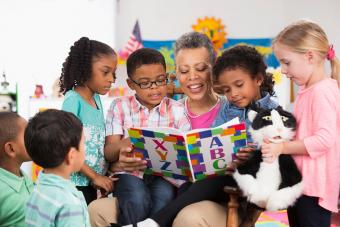
Kindergarten is a grade for growth. It is where the first true learning and reading begins. Students learn to understand letters and how they work together to make words. This is the foundation for skills that will take them through the rest of their lives.
Kindergarten Meets Common Core Standards
While schools may vary, there are very specific national guidelines that teachers must follow. These are typically the common core standards. These standards break down what students should know in writing, language, speaking, listening, math, and science.
Letters and Sounds
Learning to read is a multi-step process. The first step is learning letters. Before they can progress to reading and sight words, kids need to be able to name and write all the different letters. This includes letters in lower and uppercase, along with the sound that is associated with each different letter. The blending of sounds and simple sight words like in, and, the are taught at this level.
Grammar and Writing
Once a child knows the letters and how to write them, the next logical step is making words and sentences. With guidance from their teacher, kids learn to write simple sentences and grammatical rules, like capitalizing the first letter of a word and adding punctuation. Many times, kids will follow or trace a teacher's example of a sentence to ensure their structure is correct. Following and copying sentences can help them to start to build their own sentences like:
- I ran home.
- Mom loves me.
- I like cars.
Reading Skills
At this level, kids are progressing toward becoming early readers. By the end of the grade, students will be able to:

- Read very simple age appropriate stories and picture books
- Examine key details in a story and retell a story
- Provide information about characters and setting
- Name illustrators and authors
- Work together in reading groups
- Rhyme words
- Understand why words rhyme
- Identify different types of stories like nonfiction, poems, stories, etc.
Math and Geometry
Basic math concepts like simple numbers and shapes are learned through activities and games.
Counting
Kindergarteners learn the names of the different numbers and how to count. While they may be introduced to numbers up to 100, they learn to fluently understand and recognize numbers up to 19 by the end of the grade.
Shapes
Kids learn the basic shapes like triangles, circles, squares, etc. They also learn how to identify the different shapes such as:
- Triangles have three sides.
- Squares have four sides that are all the same.
- Rectangles have two long sides and two shorter sides.
Addition and Subtraction
Basic operations like addition and subtraction are discussed. For example, a teacher might ask what happens if you put one together with one using visual aids or counters so students can see how one plus one becomes two.
Concept of Time
Time is an abstract concept and this age group is rather concrete, but the basic mechanics of time are introduced. For example, they understand when school starts and when classes get out. They begin to understand the schedule of the day and how lunch happens at 10:45 and recess happens at such-and-such a time.
Seasons and Weather
Kids begin to use a class calendar and understand the seasons like fall, summer, spring and winter. There is usually a fun element like a sound or group activity to make calendar time fun and enjoyable. They also might discuss the weather of the day by looking out the window and seeing it is sunny or rainy.
Listening Skills

Every classroom has rules that the students begin to understand and follow. They also learn if they don't follow the classroom rules that there are repercussions for their actions. These are also typically clearly stated. Raising their hands, working collaboratively and taking turns are introduced in kindergarten.
Appropriate Self-Expression
Littles might not understand how to express their feelings or wants when they get into kindergarten but they have a good grasp on it by the end. They learn what different emotions are and how to express them with words or actions rather than tantrums.
Getting Ready for First Grade
Kindergarten sets the foundation for kids. It is the beginning of their long educational career where they learn the basics of language, math, science and social studies. They gain beginning skills of collaboration and listening.







